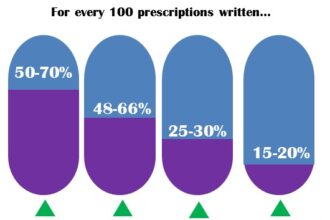 What gets patients angry—besides being upset about their diagnosis—is high drug prices. You know the story: elderly people cutting pills and having to make painful choices between taking their medicine as prescribed and paying their rent.
What gets patients angry—besides being upset about their diagnosis—is high drug prices. You know the story: elderly people cutting pills and having to make painful choices between taking their medicine as prescribed and paying their rent.
 What gets patients angry—besides being upset about their diagnosis—is high drug prices. You know the story: elderly people cutting pills and having to make painful choices between taking their medicine as prescribed and paying their rent. Yes, there are assistance programs, but often people don’t qualify or don’t qualify for enough help. Of course, it is not just the elderly. It presents many families with tough choices.
What gets patients angry—besides being upset about their diagnosis—is high drug prices. You know the story: elderly people cutting pills and having to make painful choices between taking their medicine as prescribed and paying their rent. Yes, there are assistance programs, but often people don’t qualify or don’t qualify for enough help. Of course, it is not just the elderly. It presents many families with tough choices.
What rubs salt in the wound? Glossy and frequently broadcast drug company ads on television. These now include efinaconazole (Jublia) for toenail fungus and, incredible to me, a cancer drug for a subset of patients, nivolumab (Opdivo) for lung cancer. We have heard that pharma is now spending $4 billion a year on direct-to-consumer advertising. The U.S. is one of the only countries that allows this. What many patients think is that this money should be used to lower drug costs instead of promoting single products.
As you know, I am in the patient education business, and I am a patient with two cancers myself. One medicine I take is $9,500 a month. That is not uncommon in “chronic cancer” these days. And, in MS, RA and so many other conditions the price is high as well.
The industry defends the ads as “education.” But you and I know few health conditions are simple, especially if a patient has multiple conditions or takes multiple medications or has drug allergies. And then, in many conditions, drugs are combined or even used “off label.” The ads do not, and cannot, speak to that. So the truth is the ads oversimplify many health issues. Sure, maybe for erectile dysfunction or toenail fungus the discussion is pretty straightforward but certainly not for cancer. In that area, I would suggest ads are a disservice to the patient. It’s only the ad agencies and TV networks who really benefit.
But don’t take my word for it. Recently the American Medical Association’s Board of Delegates voted to request a ban on DTC advertising of prescription drugs. They welcome “smarter patients” who have a thoughtful discussion with their doctor. But they don’t like the idea of patients simply requesting a product with little understanding of their overall condition or how a single medication may or may not be right for them. So now that a key physician group and many patient leaders are aligned, end the ads. But it’s up to the FDA and Congress to make a ban happen. Shouldn’t they agree? We can understand why pharma needs money for research to develop new medicines, but we do not understand why they need to spend billions on advertising.
Now I have a better plan: take just 1% of that money and reallocate it to support INDEPENDENT and FAIR and BALANCED education offered by groups like Patient Power, advocacy groups and foundations, and leading medical societies and providers. Right now the support pharma provides for those activities is almost nothing compared to their DTC advertising. And sustained education is clearly needed to help us all take more ongoing responsibility for our health. Step 2 of the plan is to, of course, lower prices.
I believe “smarter patients” who truly understand their condition and the array of products and lifestyle changes that can help is what should be supported, not drumming into our heads a brand name like it is a laundry detergent or toothpaste for “cleaner, whiter teeth and fresher breath.”
Let’s bring on more commercials for island vacations and power drills and bury pharma ads once and for all. Our health and our pocketbook will be better for it.
I welcome your comments!
Best regards,
Andrew





